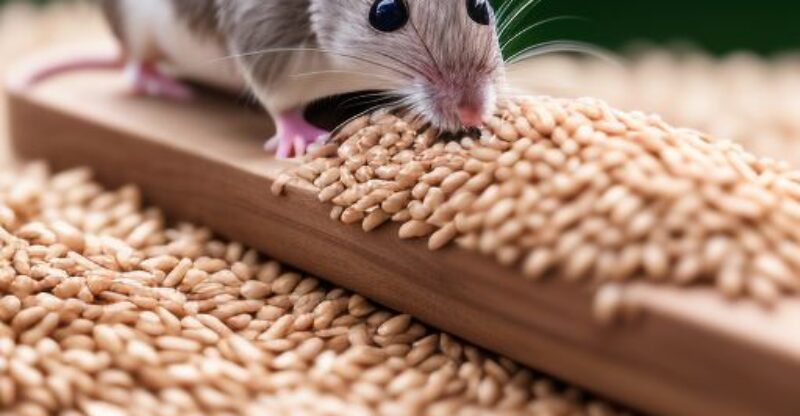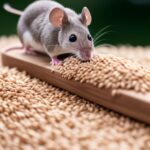How do I keep mice out of my food supply? – A Comprehensive Guide to Rodent-Proofing Your Pantry
Imagine opening your pantry and finding your food supplies nibbled on by pesky mice. Not only is it a frustrating experience, it also poses serious health risks.
Fear not, we’re here to provide you with effective strategies to safeguard your food supply from these unwelcome intruders. With our guidance, you’ll be well-equipped to create a mouse-proof pantry, ensuring your food stays untouched and safe.
Stay tuned as we delve into the nitty-gritty of understanding mouse behavior, identifying potential entry points, and implementing effective deterrent measures. With our help, you’ll transform your pantry into a fortress that no rodent can penetrate.
Welcome to the first step in your journey towards a mouse-free pantry. Let’s get started!
What attracts mice to food supplies?
Mice are primarily attracted to food supplies due to their innate scavenging nature. They have an acute sense of smell, which allows them to locate food sources from afar. Unsealed food items, particularly grains, fruits, and seeds, are a major attraction. Mice are also drawn to food scraps in trash bins, making waste management crucial in preventing a mouse infestation.
Another factor that attracts mice to food supplies is the availability of water sources. Mice, like any other living creature, require water for survival. Leaky pipes, pet water dishes, or any form of standing water can attract these pests.
The presence of shelter near food sources can also attract mice. They prefer to stay close to their food supply, so cluttered areas, such as storage rooms with food supplies, are attractive to them. Therefore, maintaining a clean and organized environment is essential in keeping mice away.
Temperature is another factor that can attract mice to food supplies. Mice are warm-blooded mammals and are drawn towards warm places during cold seasons. They often seek refuge in homes and other structures, where they can easily access food supplies.
Lastly, poor sanitation can be a significant attraction for mice. Dirty environments with readily available food sources are perfect habitats for these creatures. Regular cleaning and proper food storage can help deter mice from invading your food supply.
Remember, prevention is always better than cure. By understanding what attracts mice to food supplies, you can take proactive measures to deter them and protect your food supply.
How to store food to deter mice?
Mice are notorious for invading food supplies, leaving behind a trail of destruction and potential health risks. To deter these pests, it’s crucial to implement effective food storage strategies. Firstly, consider investing in airtight containers. Mice have a keen sense of smell, and these containers can effectively mask the aroma of food, making it less appealing to them.
Secondly, store your food supplies off the ground. Mice are excellent climbers but placing food on high shelves adds an extra layer of difficulty for these critters. Another effective deterrent is to keep your food in the refrigerator or freezer. Mice typically avoid cold areas, so refrigerated items are generally safe from their intrusion.
Lastly, ensure to clean your kitchen and dining areas regularly. Food crumbs and spills are a major attraction for mice. By maintaining a clean environment, you significantly reduce the chances of a mouse infestation.
Remember, prevention is always better than cure. By implementing these food storage strategies, you can keep your food safe and deter mice effectively.
- Use airtight containers for food storage
- Store food supplies off the ground
- Keep food in the refrigerator or freezer
- Maintain cleanliness in your kitchen and dining areas
Implementing these measures diligently can help keep your food supply free from mice and ensure a healthier and safer living environment.
Can mice chew through plastic containers?
The answer is, unfortunately, yes. Mice are known for their remarkable ability to gnaw through a variety of materials, including plastic containers. Their sharp, powerful teeth can easily penetrate the surface of most plastic types. Mice are motivated by the scent of food, and if your food supply is stored in plastic containers, it could be at risk.
To prevent mice from accessing your food, consider storing it in metal containers or glass jars with tight-fitting lids. These materials are much harder for mice to chew through. Additionally, seal any cracks or openings in your home where mice could enter, and regularly clean your kitchen and food storage areas to eliminate crumbs and food particles that could attract mice.
- Store food in metal containers or glass jars
- Seal cracks and openings in your home
- Clean your kitchen and food storage areas regularly
Remember, mice are persistent creatures. Even if you think your food is safe in a plastic container, they may still attempt to chew through it. Therefore, it’s crucial to use preventative measures and robust storage solutions to keep your food safe from these pesky rodents.
What smells repel mice?
If you’ve ever wondered how to keep mice out of your food supply, you’re not alone. One effective method is to use certain smells that mice find repugnant. Peppermint oil is a popular choice. Mice detest the strong, minty aroma, making it an excellent deterrent. Simply soak cotton balls in the oil and place them in areas where you’ve noticed mouse activity.
Another smell that repels mice is mothballs. These contain naphthalene, a scent so powerful that mice will avoid it at all costs. However, use mothballs with caution as they can be harmful to pets and children.
• Ammonia is another smell that mice find unbearable. It mimics the scent of predator urine, triggering their instinct to flee. Place small bowls of ammonia near your food storage areas to keep mice at bay.
Cloves and bay leaves are also effective. Their strong, distinctive scents are unappealing to mice. Scatter these in your pantry and other food storage areas to deter these pesky rodents.
Lastly, the smell of cayenne pepper is offensive to mice. Sprinkle it around your food supply for an extra layer of protection.
Remember, while these scents can help repel mice, they are not a substitute for proper food storage and cleanliness. Always seal your food in airtight containers and maintain a clean environment to prevent attracting mice in the first place.
Are there natural deterrents for mice?
Absolutely, there are several natural deterrents that can help you keep mice away from your food supply. One of the most effective and commonly used is peppermint oil. Its strong scent is unbearable to mice and can effectively deter them. To use it, soak cotton balls in the oil and place them strategically around your home, especially near your food storage areas.
Another excellent deterrent is mothballs. These small white balls release a scent that mice find repulsive. However, they should be used with caution as they can be harmful to humans and pets if ingested.
You can also use natural predators to deter mice. Owls and cats are known to be natural enemies of mice. Having one around your home can significantly reduce the presence of mice.
In addition to these, cleanliness is key. Mice are attracted to food crumbs and spills. Therefore, ensuring that your kitchen and food storage areas are clean can greatly help in keeping them away.
- Peppermint oil: Soak cotton balls and place them around the house.
- Mothballs: Use with caution as they can be harmful if ingested.
- Natural predators: Owls and cats can deter mice.
- Cleanliness: Keep your kitchen and food storage areas clean.
Remember, these natural deterrents are most effective when used in combination. It’s not just about keeping mice away, but also about making your home unattractive to them. By doing so, you can protect your food supply from these pesky rodents.
How to clean areas infested by mice?
To ensure that your food supply is safe from mice, it’s crucial to maintain a clean environment. Mice are attracted to areas with food particles, so regular cleaning is a necessary deterrent. Sanitizing your kitchen and pantry areas can significantly reduce the likelihood of a mouse infestation.
Start by removing all food items and utensils from the area. Then, use a disinfectant to clean surfaces. Remember, mice can carry diseases, so it’s essential to use a cleaning solution that kills bacteria and viruses.
Vacuuming is an effective way to remove any potential food sources. Pay special attention to hidden spots such as under appliances and behind cupboards.
After cleaning, ensure that all food items are stored in mouse-proof containers. These are typically made of glass or thick plastic that mice cannot chew through. Avoid storing food in cardboard boxes or bags that mice can easily infiltrate.
Sealing potential entry points is another crucial step in keeping mice out of your food supply. Check for cracks and holes in walls, floors, and ceilings. A mouse can squeeze through a hole as small as a dime, so be thorough in your inspection.
Incorporating these cleaning and prevention methods will help you maintain a mouse-free environment and protect your food supply. Always remember, a clean area is less attractive to mice, making it an effective strategy in keeping them away from your food.
Does temperature affect mice infestations?
Indeed, temperature plays a significant role in mice infestations. When the weather turns cold, mice seek warmth and shelter, often finding it in homes and food supplies. They can easily squeeze through small openings to get into your pantry, where they can contaminate your food supply.
Sealing off potential entry points is a critical step in keeping mice out of your food supply. This includes cracks, holes, and gaps in walls, doors, or windows. Mice are excellent climbers and can jump up to a foot high, so don’t overlook higher areas.
Another important factor is food storage. Store food in airtight containers made of glass or metal, as mice can chew through plastic and cardboard. Also, keep your kitchen and dining area clean and free of crumbs or food particles that could attract mice.
- Using mouse traps and baits is an effective way to control mice population. Choose a bait that is attractive to mice, such as peanut butter, bacon, or chocolate.
Lastly, consider professional pest control services if the infestation persists. They have the expertise and equipment to handle mice infestations and can provide advice on preventing future problems. Remember, the goal is not just to eliminate the current infestation, but also to prevent future invasions.
Can ultrasonic repellents keep mice away?
Ultrasonic repellents have been marketed as a solution to keep mice out of your food supply. These devices emit high-frequency sound waves that are said to be intolerable to rodents. The theory is that the unpleasant sound drives the mice away, protecting your food supply from contamination.
However, the effectiveness of ultrasonic repellents is a topic of debate. Some studies suggest that while these devices may initially deter mice, the rodents often become accustomed to the noise and ignore it. Therefore, relying solely on ultrasonic repellents may not be sufficient to safeguard your food supply.
To ensure the effectiveness of your rodent control measures, it’s recommended to combine ultrasonic repellents with other methods. For instance, proper food storage is crucial. Always store food in rodent-proof containers, and keep your kitchen and pantry areas clean.
Sealing potential entry points is also recommended. Mice can squeeze through tiny holes, so inspect your home for any cracks or gaps and seal them off.
- Use ultrasonic repellents as part of a multi-pronged approach.
- Store food in rodent-proof containers.
- Seal off potential entry points.
Remember, while ultrasonic repellents can be part of your strategy, they should not be the only measure you take to protect your food supply from mice.
In Conclusion: Safeguarding Your Food Supply from Mice
In summary, understanding what attracts mice to food supplies and how to store food to deter them is crucial. It’s worth noting that mice can chew through plastic containers, so consider investing in metal or glass storage units for better protection.
Various smells, such as peppermint and cloves, can repel mice, and there are numerous natural deterrents to explore. Cleaning areas infested by mice thoroughly is essential to prevent future invasions, and remember, temperature can indeed affect mouse infestations.
Ultrasonic repellents may serve as an effective solution to keep mice away, although their effectiveness can vary.
The importance of the subject, “How do I keep mice out of my food supply?” cannot be overstated. Mice not only spoil food but also pose health risks. By implementing the aforementioned strategies, you can safeguard your food supply and ensure a healthier, mouse-free environment.
As for the future, advancements in natural and technological repellents are expected to provide more effective solutions to this age-old problem. Keep abreast of these developments to ensure your strategies remain effective and efficient.










